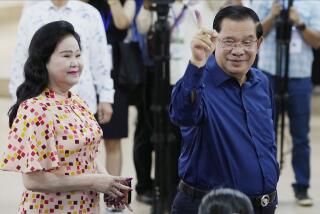Multi-Party State Possible, Cambodian Premier Says
- Share via
JAKARTA, Indonesia — Hun Sen, premier of the Vietnamese-backed government in Cambodia, said Tuesday that it is possible his regime will agree to resistance demands to change the constitution to make Cambodia into a multi-party state.
After opening talks here with Prince Norodom Sihanouk, leader of the three-party resistance coalition that opposes the Phnom Penh government, Hun Sen said the two sides have made “quite big progress” toward a political settlement of the Cambodian conflict. Sihanouk did not comment on the negotiations.
The Hun Sen government and the resistance are under pressure to reach a compromise on a government for Cambodia after the departure of the remaining Vietnamese troops from the country, now scheduled by Sept. 30.
Hun Sen said he has invited Sihanouk to return to Phnom Penh as head of state and that Sihanouk has agreed, provided that all Vietnamese troops leave the country and agreement is reached on further constitutional changes.
New Flag and Anthem
The Cambodian government announced Monday a series of changes to the constitution, including a name change for the country, from Kampuchea back to Cambodia; a new flag, and a new national anthem as part of the package of concessions it is offering in advance of the talks.
Hun Sen held up at a news conference Tuesday an amateur drawing of the new flag: red over blue with five towers in yellow representing the Angkor civilization. Sihanouk had suggested gray for the towers but finally, during lunch, gave his agreement to yellow, Hun Sen said.
The Cambodian premier also said that the new national anthem is still being written and that the words and music will be sent to Sihanouk, an accomplished musician, for approval.
Hun Sen said that during the talks, Sihanouk said his support depends on the constitution being rewritten to permit the inclusion of a multi-party system, replacing the sole authority now given to Hun Sen’s Marxist People’s Revolutionary Party of Kampuchea.
Differ on Khmer Rouge Role
Hun Sen said he agreed to consider the proposed change, arguing that “sooner or later the system in Cambodia will be a multi-party system. If we do not have a multi-party system, we cannot end the war in Cambodia.”
He said he and Sihanouk had diverged on the issue of the participation of the Khmer Rouge, the ultra-radical faction that governed Cambodia from 1975 until the Vietnamese invasion in late 1978 and under whose reign more than a million people died of brutality and starvation. He said they agreed to make the question of the Khmer Rouge “the subject of further discussions.”
Hun Sen opposes including the Khmer Rouge in a future government. Sihanouk maintains that no settlement will be workable without them, and he reportedly told Vice President Dan Quayle as much when they met here Monday. But Quayle, before departing for Singapore early Tuesday, opposed their participation.
“There’s no doubt where our position is as far as the Khmer Rouge returning to power,” Quayle told reporters. “It is a non-starter from the very beginning.”
Position for Sihanouk
If Sihanouk agrees to return to Phnom Penh, Hun Sen said the government would create a Supreme National Council to organize elections, with Sihanouk as chairman and leaders of the other factions being deputy chairmen. He said this could also include Cambodians now living outside the country who are not part of one of the three resistance factions.
The current regime in Phnom Penh would continue to function under the Hun Sen proposals, to “maintain social order and manage economic life” during the transition period.
Some resistance leaders have demanded the dismantling of the Hun Sen government because of fears that the existing administration will be able to manipulate the outcome of the voting.
Agree on Conference
Hun Sen said that he and Sihanouk agreed that an international conference on Cambodia should be held in Indonesia and France during July. The conference, among other things, would determine the composition of an “international control mechanism” to supervise the elections and maintain a cease-fire.
Hun Sen also met during the morning with Son Sann, a former Cambodian prime minister who heads a non-Communist wing of the resistance coalition known as the Khmer People’s National Liberation Front. He indicated that Son Sann was more unyielding than Sihanouk, insisting on the dismantling of the Phnom Penh regime and its replacement with a four-party coalition government.
More to Read
Sign up for Essential California
The most important California stories and recommendations in your inbox every morning.
You may occasionally receive promotional content from the Los Angeles Times.













